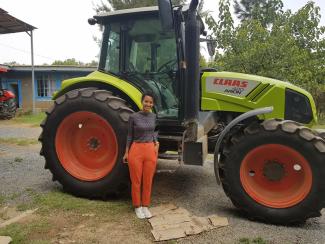KfW
German farming technology for Ethiopian vocational schools

Ethiopia is a multi-ethnic country that is home to 100 million people and has incredible potential in the fields of agriculture, industry and tourism. In recent years, the country’s economy has seen some of the strongest growth in the world.
It is a nation with breathtaking landscapes, its own script and a history that stretches back thousands of years. Not without reason is Ethiopia called the “cradle of humanity”. The country was already inhabited about 3 million years ago, as proven by a skeleton discovered in 1974: “Lucy” is now housed in the National Museum in Addis Ababa. Coffee, an important export product, originated in Ethiopia, while other agricultural products include cereals and cut flowers. Agriculture is the cornerstone of the economy, accounting for more than 40 per cent of GDP and about 85 per cent of exports.
The education sector plays a key role in advancing the country’s economic development and creating opportunities for its growing population. Since the 1960s, KfW Development Bank has been committed to improving vocational schools and teacher training – including in the agricultural sector – and has provided more than EUR 1 billion to date. Problems that stand in the way of increased productivity: a low level of mechanisation, defective agricultural machinery and spare parts that are difficult to procure. In many places, there are no mechanics who can maintain and repair the machinery. In 2019, KfW Development Bank will provide EUR 8 million to twelve agricultural vocational schools to equip them with tractors and other “medium technology level” machinery on behalf of the Federal Ministry for Economic Cooperation and Development (BMZ). Teachers and students are trained in operation, maintenance and repair. To this end, a training cooperation was agreed with the German agricultural machinery manufacturer Claas, which supplies the necessary machinery including spare parts and – as the only company in the country – operates a training centre with twelve mobile workshops.
Samrawit Kiros Haylu has been working as a teacher at the Wukro Agricultural College since October 2018. She holds a bachelor’s degree in agricultural engineering and was one of the first to benefit from the practical training after the tractors arrived. What exactly does her job involve? “I work as a driving instructor – this of course also includes driving with auxiliary equipment like a plough. But I’m also responsible for repairs and maintenance, along with instruction in safety and theory.” About half of the almost 800 students and about 40 per cent of the teaching staff are women. And what is it like for male students to be taught mechanics and tractor driving by a woman? “When we have the opportunity as women to prove ourselves in a job, we are very tough and conscientious. A good prerequisite for successful instruction,” Samrawit says.
Link
KfW, 2019: Africa – continent of opportunity.
https://www.kfw-entwicklungsbank.de/PDF/Download-Center/PDF-Dokumente-Medienkooperation-mit-E-Z/2019_10_Afrika_E.pdf







